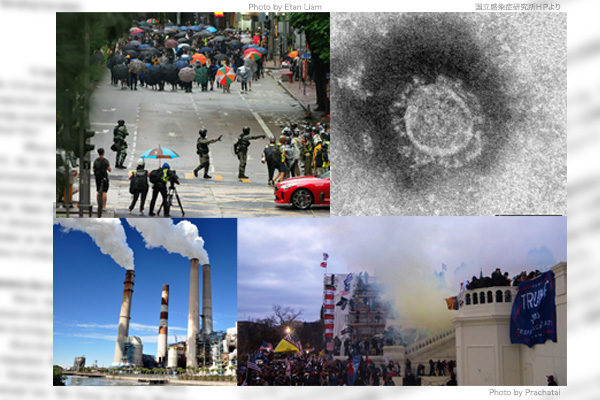The world witnesses turbulent events. In the year that opened with deviant behaviors in the United States and China, the international community faces an extraordinary crisis. The essence of the crisis is a danger of the world being swallowed by expanding China.
The time has come for Japan to ask how it can contribute to the free world. We have once resisted threats from Western powers. Can we fend off threats from the Chinese Communist Party and demonstrate Japan’s course to the world this time? The current crisis is far more serious than the one that started with the arrival of U.S. black ships in Japan more than 160 years ago. This is because the current international situation is far different from the past one.
More serious international crisis
In the second half of the 19th century, Western powers threatened Japan but failed to devote themselves to invasion because of their respective big domestic problems. The U.S. was plagued with the four-year Civil War, losing 620,000 soldiers. Britain, France, and the Ottoman Empire fought the three-year Crimean War with Russia from 1853 in Europe. In the rarely large war, the two sides lost a combined more than 750,000 soldiers including those who died of diseases. Western powers thus had limited resources left for invading Japan. It was fortunate for Japan.
Japan’s government and people then felt the nation’s fateful crisis. The people were impressed with Emperor Meiji’s Charter Oath of Five Articles and the government came up with the policy of “increasing wealth and military power.” Both the people and government retained a sense of tension.
How about now? In the U.S. that has provided a foundation for Japan’s defense, an unprecedented turmoil occurred over the presidential transition. The incoming Biden administration will be preoccupied with the novel coronavirus pandemic, racial discrimination and social divide, economic stagnation, global warming, and other energy-consuming issues. Can we place high expectations on President-elect Joe Biden’s pledge to enhance cooperation with U.S. allies?
Meanwhile, China has been advancing its authoritarian, violent policy of a Chinese Empire in defiance of protests from the international community such as the mass arrest of pro-democracy activists in Hong Kong. The Chinese government has also allowed the Wuhan virus to spread throughout the world while concealing its initial awareness that the virus can be passed from human to human as noted by U.S. Secretary of State Mike Pompeo on May 6 last year and confirmed by a scoop of secret Chinese documents on the February 2021 issue of the Seiron magazine,. Nevertheless, Chinese Foreign Minister Wang Yi celebrated 2020 as a meaningful year during which China made an epoch in its diplomacy.
Inattention could ruin a country
On December 11, the Chinese Communist Party at its Politburo collective study session emphasized the importance of the “community with a shared future for mankind” and of the idea for “firmly maintaining the concept of national security.” What Chinese President Xi Jinping terms “national security” means the security of the regime, i.e. the security of the Xi Jinping dictatorial regime. President Xi is building a second Mao Zedong regime, deepening inevitably a confrontation of values between China and Russia on one side, and Japan, the U.S. and Europe on the other.
The time has come for Japan to pay close attention to the U.S. Biden administration and Europe especially Germany, and contribute to establishing cooperative structure for the free and democratic camp. Above all, Japan should fight in all senses to maintain nationhood. Can Japan do so even when it cannot amend its 73-year-old constitution? Unless the government and people brace themselves, Japan would really be at risk. This is the reality of the year.
Yoshiko Sakurai is President, Japan Institute for National Fundamentals.


